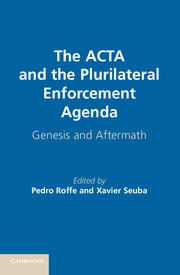Book contents
- Frontmatter
- Contents
- List of Contributors
- Foreword
- Acknowledgments
- Acronyms
- Introduction
- PART I THE FINAL ACT: ITS MAIN FEATURES AND CONTENTS
- 1 An Overview of the Agreement
- 2 ACTA Initial Provisions and General Definitions
- 3 ACTA General Obligations with Respect to Enforcement
- 4 Provisions on Civil Enforcement – Section 2 of ACTA
- 5 Legal Framework for Enforcement
- 6 ACTA and Beyond
- 7 ACTA’s Digital Chapter
- 8 The ACTA Committee
- PART II DOMESTIC LEGISLATIVE CHALLENGES
- PART III IMPACT ON RELATED PROCESSES
- PART IV VIEWS FROM STAKEHOLDERS: LESSONS
- PART V WHAT LIES AHEAD ACTA
- Annex I Anti-Counterfeiting Trade Agreement
- References
- Index
- References
7 - ACTA’s Digital Chapter
Remaining Concerns and What Can Be Done
Published online by Cambridge University Press: 05 December 2014
- Frontmatter
- Contents
- List of Contributors
- Foreword
- Acknowledgments
- Acronyms
- Introduction
- PART I THE FINAL ACT: ITS MAIN FEATURES AND CONTENTS
- 1 An Overview of the Agreement
- 2 ACTA Initial Provisions and General Definitions
- 3 ACTA General Obligations with Respect to Enforcement
- 4 Provisions on Civil Enforcement – Section 2 of ACTA
- 5 Legal Framework for Enforcement
- 6 ACTA and Beyond
- 7 ACTA’s Digital Chapter
- 8 The ACTA Committee
- PART II DOMESTIC LEGISLATIVE CHALLENGES
- PART III IMPACT ON RELATED PROCESSES
- PART IV VIEWS FROM STAKEHOLDERS: LESSONS
- PART V WHAT LIES AHEAD ACTA
- Annex I Anti-Counterfeiting Trade Agreement
- References
- Index
- References
Summary
Introduction
The Anti-Counterfeiting Trade Agreement (ACTA) is a new plurilateral treaty with the goal of “improving global standards for the enforcement of IPR [in order] to more effectively combat trade in counterfeit and pirated goods.” It was negotiated by Australia, Canada, the EU (and EU member states in their own national capacity), Japan, Korea, Mexico, Morocco, New Zealand, Singapore, Switzerland and the United States between 2008 and 2010, leading to the adoption of the final text on 3 December 2010. It is currently undergoing internal ratification procedures in negotiating states. It is open for signature until 31 March 2013; six signatories are needed before it comes into force.
During negotiation ACTA was criticized by different stakeholders on many grounds. First of all, the secret nature of negotiations was condemned by the online community, academics, as well as by the institutions of the EU such as the European Parliament and the European Data Protection Supervisor. Secondly, critics argued that by negotiating the agreement plurilaterally, parties are trying to avoid the established fora for IP agreements (i.e. the World Intellectual Property Organization [WIPO] or the World Trade Organization [WTO]) and thereby threatening the established international institutional framework. Thirdly, although ACTA is intended to be a special agreement made under the auspices of the Agreement on Trade-Related Aspects of Intellectual Property Rights (TRIPS) and thus not derogate from its obligations, some have argued that it may still violate TRIPS. Its legality in some of the negotiating states has been contested. For instance, in the EU, the European Commission has repeatedly made reassuring noises that it will not set any acquis-plus standards, but European academics have warned that ACTA may lack conformity with EU law and require additional action by the EU institutions. Its legality under US law has also been disputed. Various issues addressed by ACTA have been attacked by groups of academics as well as individuals worldwide,probably the most important of which being privacy and restriction on freedom of expression on the Internet, criminal liability and border measures. Last but not least, strong concerns were expressed by developing countries which did not join the negotiations, such as China, India and Brazil. Arguably, ACTA will be extended to non-negotiating parties by being adopted as a new baseline in bilateral negotiations.
- Type
- Chapter
- Information
- The ACTA and the Plurilateral Enforcement AgendaGenesis and Aftermath, pp. 115 - 142Publisher: Cambridge University PressPrint publication year: 2014

